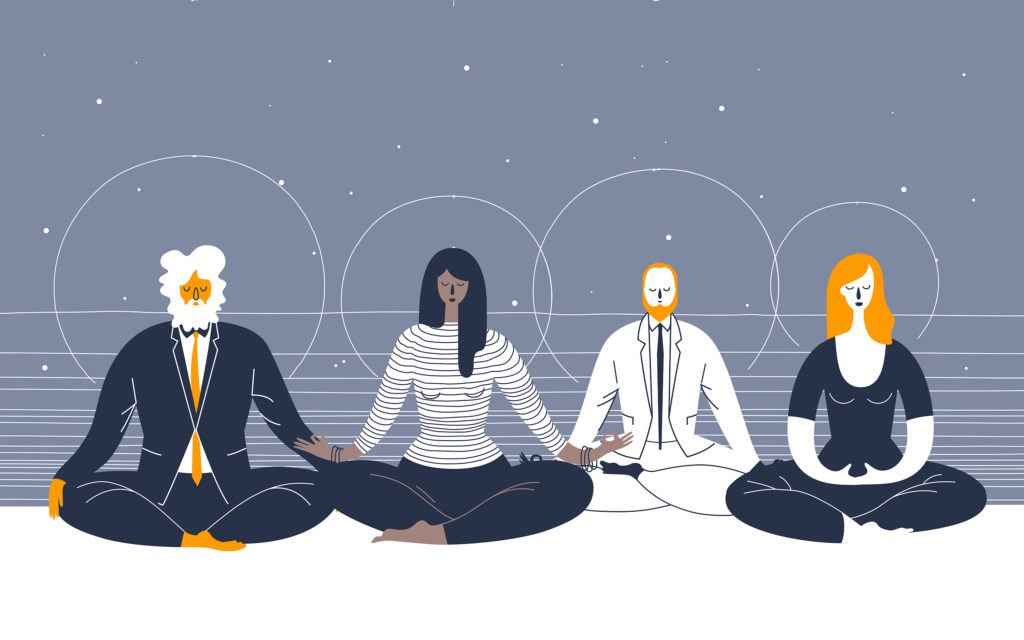Meditation often has the stigma of being a new-age practice that only enlightened individuals with a predisposition to Eastern religious teachings embrace. Over the last few years, innovative companies and even longstanding giants in their industries, have introduced meditation and mindfulness into their workplace. Promising data and information of employees who applied the self-reflective discipline have absolved meditation from its previous intangible designation and hard to quantify effectiveness.
Insurance giant Aetna has estimated that mindfulness and meditation have saved the company around 2,000 dollars in employee healthcare expenses and another few thousand dollars in the uptick of employee productivity. Entrepreneurs, executives, and corporate greenhorns alike are now all adopting the secular exercise of grounded mindfulness that Buddhist monks did centuries ago.
From Fortune 500 companies to pre-Series A funded startups, mindfulness is becoming an integral part in aiding in a healthier balance for laborers. The organizations that promote mindfulness actions read like the S&P ticker. Apple, Procter & Gamble, Deutsche Bank, Antea, Google, AOL TimeWarner, Yahoo!, Target, Ford and Nike are among the growing number of enterprise that employs mind, body, and soul rumination rituals.
Meditation and mindfulness in the capitalistic sectors have become a cottage industry of its own. There are corporate silent meditation retreats. Meditation drop-in studios have become popular across the country. The tech industry has infiltrated the market with apps such as Calm, Insight Timer, Headspace, Simple Habit, Breethe, and 10% Happier. Companies can even hire the services of meditation training operations, which will lead your team in the fundamentals of inward reflection and give them the tools to maintain the custom. Meditation is mainstream.
So, practically speaking, how does meditation work in transforming you and your employees’ levels of productivity?
The practice positively alters your mind. Improved focus is among the chief advantages that meditation brings the practitioner. At the workplace, distractions inundate us. Multiple screens notifying you of matters that deserve your attention (and some that don’t), coworkers that disrupt your workflow with their needs, and your wandering mind can nudge you from your center.
Meditating, over time, will help you regulate yourself when you aren’t focused. Multitasking is better in theory than in execution. Ideally, multitasking makes us a better worker, but in actuality, it makes us more prone to mistakes. We only have so much bandwidth and cognitive capacity to execute tasks swiftly and error-free. A more precise level of focus will help you complete assignments more efficiently.
Self-examination can synthesize your creativity and problem-solving. The calming effects of connected breathing and deep inner thoughts alleviate stress and anxieties. By not preoccupying yourself with the pressures of work and obligations that will ultimately pass, in meditating, you can think both inside and outside the box. Often the answer may be right in front of our face to questions we can’t crack because our mind is taxed. The tranquility that meditation can bring allows you to make judgments quicker and easier. And if an issue requires an inventive approach, sitting with yourself in a quiet atmosphere, you can push yourself towards imaginative solutions.
Reflection is a discipline that keeps you disciplined. During the first couple of meditation sessions, the mindfulness apprentice’s brain will race with other thoughts amidst the stillness. In time, the meditator will resiliently learn to focus and be patient. Just like they persist in their work, striving to accomplish a clear consciousness will have a worthwhile outcome. The discipline in practice itself will condition you to be more regimented in your labor.
Mindfulness leads to better decision making and being less reactive. Meditation is about observing rather than forcibly participating. The meditator will address situations with a more open mind. Tolerance gleaned from meditating will assist in the treatment of concerns out of one’sone’s control. Rather than getting hung up on mundane details, acceptance and moving forward will prevail. After conditioning regularly in the centering exercise, the meditator will notice restraint in the decision-making process.
Once utilizing the practice becomes second nature, the meditator will see failures in a positive light. Introspection will manifest all shortcomings as teaching moments and lessons. The focus won’t be on what was lost, but what was gained.
Meditation can lead to less long-term health risks and absenteeism. If workers are taking preventive steps to avoid a toll on their mental well-being, their body and mind will reward them with a healthier operating system. Workplace stress is in lockstep with employee sickness. Checking in with one’sone’s self can prevent significant health risks.
While meditation is proven effective in employee performance enhancement, it’s not a cure-all. Conflicts will arise, and issues out of anyone’s control will persist. Meditation will better prepare you to navigate yourself through hardships and aide in maintaining a balance in a healthy way of self-sustaining. If the arena of business is all about an edge, meditation is the blade’s handle.


